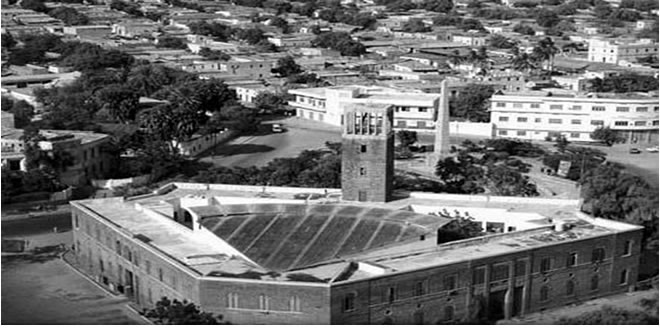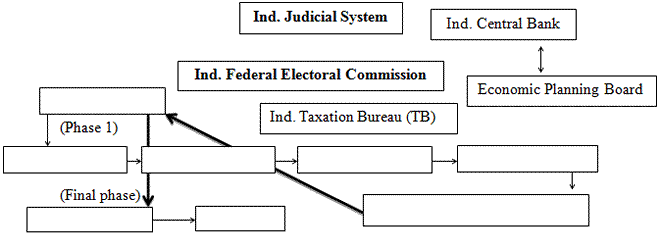
Old Somali Parliament, Mogadishu, Somalia (Courtesy of Wikimedia)
by Hassan Mire
Thursday, May 23, 2013
In Mandarin (China’s national language), the word crisis is represented by two characters, danger and opportunity; danger is the inability to learn from the past, while opportunity is the ability to understand the past mistakes and avoid repeating them. This metaphor is relevant because Somalia’s more than twenty-two years of war has destroyed all governmental institutions whether inaugurated by the colonial powers or sequent Somali governments, and thus, this calls forth new ways to approach our future politics prudently. The unfortunate fortunate is that this generation has the opportunity to re-formulate our political system -- that is to create a Somalian political system that has its roots in Somali tradition, and differs from those that preceded, which has ignored the basic freedom of Somali soul and Islam. As the Scottish historian, Thomas Carlyle wisely reflected, “of all the paths that [society] could strike into, there is, at any given moment, a best path,” one that serves the society’s interests best and resonates with its traditions, religion and social aspirations – finding that most suitable political system is the challenge.
The question then arises, now that we have this golden once in a lifetime opportunity to start anew, do we have the courage and intellect to mold our own political system that draws its awareness from past national experience and avoids the political shortcomings of other nations. Is multiparty politics the way forward for Somalia? Would one party system be the alternative, maybe dictatorship or theocracy? Should Somalia continue the 4.5 system when electing their leaders? In other words, what political system should Somalia adopt? Every concerned citizen should be asking these basic questions because the political system we adopt determines our collective future. Currently in Somalia, there are at least four different Presidents at the national and regional level competing for power excluding the five in Jubaland, and as more federal regions form, we should expect this problem to worsen. Compounding this dilemma is the liberal multiparty “democratic” political structure that is taking shape in Somalia, which practices an outdated 18th century Eurocentric thinking. To reiterate, Somalia has tried varies imposed political or governmental models including Theocracy and Talibanist during Al-Itihad and Al-Shabab reigns, respectively, in some parts of the country; Dictatorship and Social-Marxist during Siad Barre era, and even Liberal Democracy during first Somali State in mid 50s to late 60s where multiparty politics divided the nation. We all know that every political system has its advantages and limitations but there’s always one that suits better, is progressive, intrinsic, and finding that should be part of our national discourse.
What is our solution? The solution, use the traditional power sharing Somali political system -- the decentralized Somalia guardianship political structure that has held Somalia’s clan polity together for ages fused with Islamic Bai’ah (social contract). Every Somali tribe has guardians: odayaal dhaqameed that are selected from the locals to represent their own community/tribe via representation through consultation (R2C), which is essentially a traditional Somali power sharing political system, which is also technically Islamic: Ahl al-Hall wa'l-Aqd (those who’re eligible to bind and dissolve – respected members of the community). I concur that hardly any Somali would prefer a clan based political system, but there’s nothing amiss about borrowing ideas that have served the clan polity well. However, it’s self-evident, based on our own experience, that no nation should adopt political system without a long and thoughtful musing. Even in Islam, Taqlid (blind following of ancient authorities in the interpretation of Islamic law) is discouraged in some schools of Islamic thought.
Nonetheless, what I’m proposing here is a political system that has no political parties at all – zero political parties, but fully functioning unitary federal and representative government that gives each Somali citizen an opportunity to represent his/her community, or be represented by the R2C Somali system. This is an individualistic, decentralized, community oriented and consultation based political system, structured in five steps or phases as follows:
1st phase: Individual candidates will stand for a local election to join the local community assembly such as the town’s assembly. This starts the chain of Shuura council/Ahl al-Hall wa’l-Aqd.
2nd phase: The newly elected town assembly, among themselves, will elect members to represent their constituency in the next assembly, for example, in the district assembly.
3rd phase: The district assembly, again, among themselves, will elect members to represent that district in the regional/gobol assembly.
4th phase: The gobol assembly, headed by Shuura council like the Swiss collegial system, where the executive power is shared, (this will weaken the power of local presidential system that competes for power with the federally elected President, and it diversifies power locally. Instead of one, a group shares the executive voice headed by a governor. Thinking about this, Kismaayo comes to my mind: a perfect solution for that problem) will elect members to represent the gobol in the federal assembly.
5th phase: The federal assembly, within its members, will elect say three candidates that they approve, to seek for a national approval: a popular vote – the candidates will make Bai’ah with the Ummah (social contract with the masses). Finally, the president-elect will pick the cabinet.
All things being equal, this system will bar private funding for all political campaigns excluding the 1st phase, in which restrictions will be set on how much a candidate should spend on campaigning: for example, the poorest of the two, or more candidates, will determine how much they should spend (pegging system), or the Federal Electoral Commission (assuming there is one) will set the limit. On other hand, during the presidential campaign, the federal government allocates the funds (an equal amount for each candidate). Secondly, in order to keep in check the influence of the gobol and the federal assembly on president elect’s cabinet choices, the system will limit the number of picks from those assemblies in order to give the larger Somali public a chance to serve their government in the highest level.
On side note, so many of Somali “thinkers” or opinion-makers argue for or against various political systems, I don’t want to add that argument, but to present something that is from us.
Is this system Sharia compatible? In fact, it’s Islamic as any system could be, because in Islam, consultation (Shuura), Ijmaac (consensus: approval voting), Al-Huriya (freedom: making their own decisions), Al-Huqquq Al-Sharciya (Electoral/public/sharia: legitimate rights), Bai’ah, are the principles that guide Islamic governance, large or small, and this system uses that same principles (representation, council, consensus, approval voting). It’s also Somali because power is shared through the system and it’s bottom-up, individualistic and localized, which allows locals to locally manage their affairs. In this system, village-voice is important! Check the following illustration as an example:

The diagram above shows an independent (Ind) Judicial system, which is in Islam has the highest authority. It also has a Central Bank, Internal Revenue institutions that are independent but share decision making with the executive office and the parliament, and Economic Planning Board that will coordinate and plan economic activities nationwide with other institutions. This government structure should also have Council of Islamic Scholars Assembly for Islamic law issues independent from the Judicial system; Odayaal Dhaqameed Assembly, for xeer, cultural and other issues (I think Somaliland has one); and Dumar (women) Assembly for, not limited to, women’s issues… dictate policies that will affect women’s affairs. Although we have some of these institutions in our society indirectly, we should expand and nationalize them.
Furthermore, in order to avoid information overload, and help citizens to have adequate information about candidates and the issues, the system shouldn’t schedule all elections to run concurrently. Moreover, China’s ten-year government tenure system and five/ten years economic plans should be an option to emulate for the sake of political stability.
Of course, even this system will have its shortcomings and people will make associations. However, this system is inclusive, it allows communities to micro-manage their affairs, it makes governance extra responsive and accountable, it will polish our future leaders in the process, and grant each community an opportunity to convey their concerns through representational politics without the hassles of political parties or the 4.5 method. We have to be wiser to solve our future problems before they arise, thus, it’s our responsibility, as Somali citizens, not the UN, to think critically about what political system we’re creating for future generations and for ourselves. Whichever political system our current leaders adopt and leave behind for generations to come as legacy, it’s important that Somali leaders to ask themselves which political system is native, inclusive, compatible with Islam, smart and suits our traditions and culture better.
Hassan Mire
Studies Economics and Global Studies (comparative politics) at University of Wisconsin
Email: [email protected]